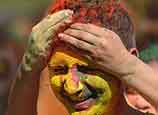
Finally falling in love and having an outlet for his long-oppressed emotion immersed Yang in happiness. But it didn't last long.
In 2001, Yang's parents repeatedly urged him to get married. With no other choice, Yang disclosed his real sexual inclination, hoping to be understood and accepted by them.
Yang recalls the evening of his coming out. Sitting with his parents in a bedroom, Yang told them, "I am gay, I don't like women," and explained how he became convinced.
But he did not convince his parents. During their talk, Yang's father kept murmuring 'not possible' and asking Yang how he became like this.
He tried to win their understanding by spelling out, "I also want to lead a normal life, but I can't help myself. Although I've been going out with a girl for four years, I never touched her hands."
However, the discussion soon descended into a fight, with his furious father roaring, "Don't try to find excuses [to break up with Yang's then girlfriend]," and Yang making the accusation to his parents that "It is your genes that made me gay," citing a hypothesis he read in a book that homosexuality is genetic.
Later that evening, Yang's parents brought in reinforcements consisting of his uncles and aunts to talk Yang out of homosexuality.
His father insisted that he get married, saying "I would rather you divorce than never marry." His parents, who lived in the countryside, where people tend to be more conservative, could not stand gossip from other villagers.
The frustrated young man left home the next day. "When I returned half a year later, my parents were not mad at me any longer, and my father, who seldom cooked, made me my favorite seafood. Thinking of all the miseries I created for them and their unconditional love to me, I softened," he recalls.
Yang finally got married later that year, but divorced after just three months.
Four years on, in 2005, Yang stepped into a second marriage that he says he could never have imagined after the first. This time, an outgoing woman, blind to Yang's real sexuality, was attracted to him and started pursuing him right in the period in which he broke up with his boyfriend of eight years.
"I was deeply hurt by the break-up and no longer had faith in homosexual love. At that moment, I just wanted to get married and lead a normal life," Yang explains.
However, his parents fiercely rejected the decision as they were clear about his sexuality and refused to arrange a ceremony for them. So the couple got married on their own and departed for a honeymoon.
Things did not work out as he wished. "I really thought I could distance myself from homosexual circles but I couldn't," Yang says. During their 15-day trip, the couple had an awkward sexual incident that saddened the bride, and Yang remembers seeing her "crying in pajamas in the hallway." But the bride did not have the faintest idea of what lay at the root of their problems.
In the following eight years so far, the couple have only made love five times, all in an unsuccessful attempt to conceive a child. "I felt deeply guilty and didn't know how to face her," Yang says.
To relieve his guilt, he treated his wife the best way he could and has taken good care of her family as well. "When her mother was hospitalized after a brain hemorrhage, I left my work behind and attended her bedside for months." Yang's parents also treated his wife like their own daughter to "make up for their son's mistake."
But his feelings of guilt cannot be totally laid down. Though an unsatisfying sexual life is not necessarily lethal to a marriage in China, where women are often deemed not virtuous for speaking explicitly about or showing interest in sex, being childless is another matter. This gradually poisoned the couple's relationship, with them fighting about it occasionally.
During these incidents, even his virtuous wife could not help complaining, "I demand nothing of you but to let me feel I am a woman."
"I cannot even satisfy such a simple wish in her," Yang says, tears welling up in his eyes.
As time went by, he gave up on making their marriage work and cheated on his wife with another man. The resulting menage a trois has tragically worked as Yang and his wife now only reunite at weekends because the husband has to attend the restaurant day and night.
Yang's boyfriend moved in with him in the restaurant (retrofitted from a four-bedroomed residential apartment), but his wife still continued to visit him every weekend. "I think that was when she discovered my problem," he speculates, although Yang told his wife the man was just helping out in the restaurant.
Yang recalls that his boyfriend once slipped into his bed, snuggling with him after his wife got up, but she only jokingly remarked 'look how happy you are when he is under your blanket.'
But they never openly talked about Yang's being gay. Like his parents, many Chinese do not accept the idea of homosexuality, taking it as a correctable morbidity.
In 2007, Yang was diagnosed HIV-positive but his wife fortunately not. Yang still kept her in the dark, getting a blood sample from her on the pretext that it was needed for a hepatitis test. After the discovery of his condition, however, Yang began trying to persuade his wife that they should divorce.
Due to social stigma, many people with HIV in China even withhold their HIV status from close relatives. Some localities have endeavored to make it legally binding for HIV-positive people to inform their spouses, moves which have sparked fierce opposition from the HIV community.
"I have brought up divorce many times and encouraged her to date other men because I want her to start a new life, but she refused each time," Yang sighs. She has always believed that the fundamental problem between them is that Yang is not mature enough (she is two years older her husband) and things will improve when he gets ages.
Lack of public discussions about homosexuality keeps a lot of women, especially less educated ones, unaware of the landmine they may tread upon, and even if they realize someday, many will not let go, clinging onto gay husbands in the hope of turning them straight.
"We may look an admirable couple, doing the very best to care for each other and living a well-off life, but it hurts to think how she has turned from a happy and extrovert girl when we first met into a sad woman whose face is full of melancholy."
In her book "The Subculture of Homosexuality," renowned sexologist Li Yinhe estimated that there are 36 to 48 million homosexuals in China.
A large percentage of them surrender to pressures coming from their families and society by entering into heterosexual marriages.
According to HIV/AIDS and homosexuality expert Zhang Beichuan's citing of his own research in 2012, 80 percent of gay men in China have married or will marry a woman.
However, changes are under way, with China developing more tolerance of homosexuals, particularly among young people and in big cities.
Li Hu, head of Haihe Star, a Tianjin-based HIV/AIDS non-governmental organization, says, "I find fewer and fewer friends and people we work with are married gays."

















 Exhibition marks 10th anniversary of Leslie Cheung's death
Exhibition marks 10th anniversary of Leslie Cheung's death


![]()
